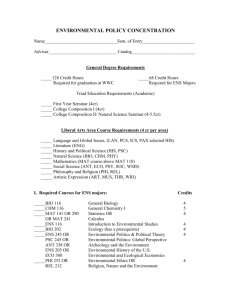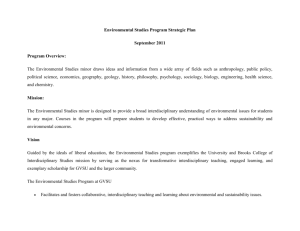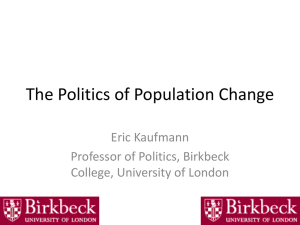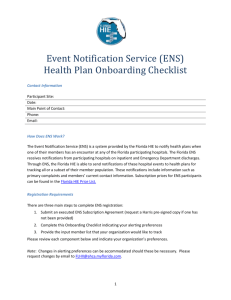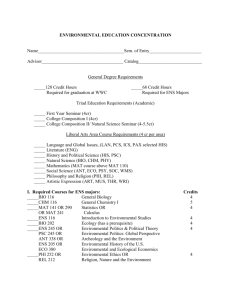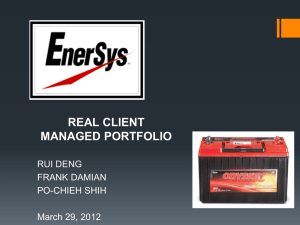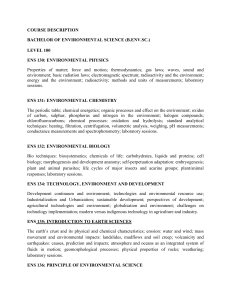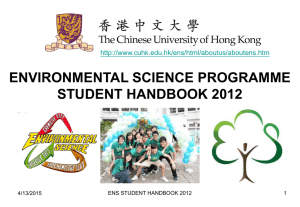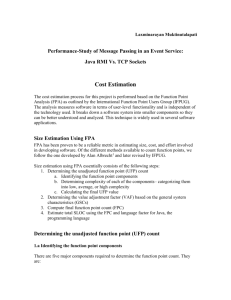International selection FAQ
advertisement
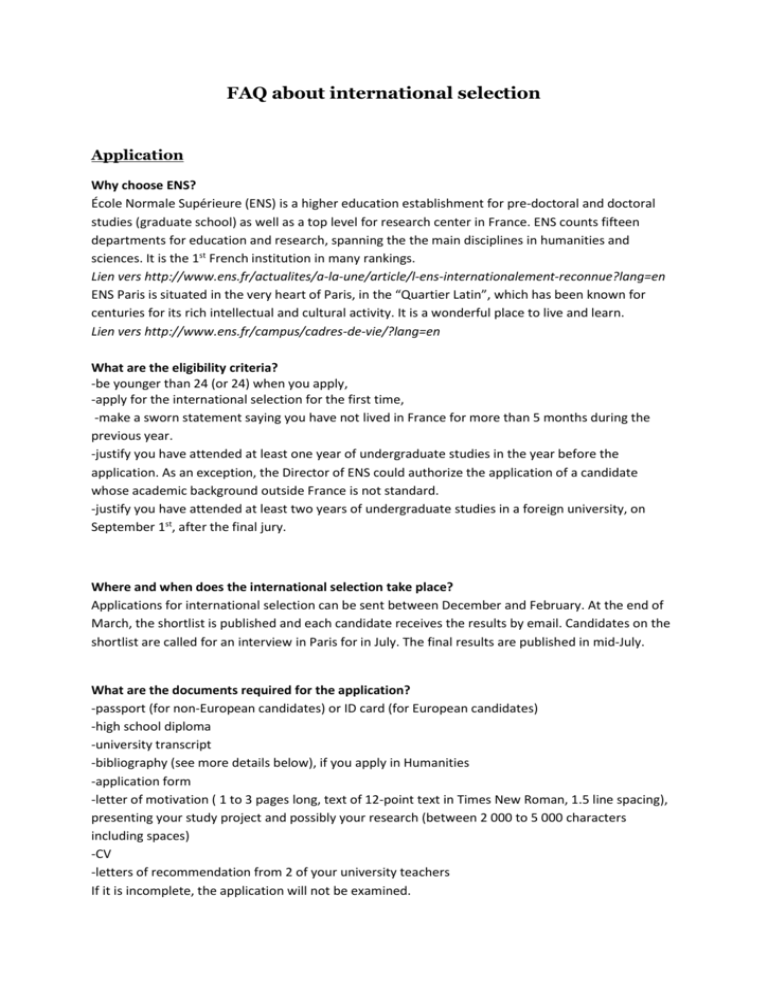
FAQ about international selection Application Why choose ENS? École Normale Supérieure (ENS) is a higher education establishment for pre-doctoral and doctoral studies (graduate school) as well as a top level for research center in France. ENS counts fifteen departments for education and research, spanning the the main disciplines in humanities and sciences. It is the 1st French institution in many rankings. Lien vers http://www.ens.fr/actualites/a-la-une/article/l-ens-internationalement-reconnue?lang=en ENS Paris is situated in the very heart of Paris, in the “Quartier Latin”, which has been known for centuries for its rich intellectual and cultural activity. It is a wonderful place to live and learn. Lien vers http://www.ens.fr/campus/cadres-de-vie/?lang=en What are the eligibility criteria? -be younger than 24 (or 24) when you apply, -apply for the international selection for the first time, -make a sworn statement saying you have not lived in France for more than 5 months during the previous year. -justify you have attended at least one year of undergraduate studies in the year before the application. As an exception, the Director of ENS could authorize the application of a candidate whose academic background outside France is not standard. -justify you have attended at least two years of undergraduate studies in a foreign university, on September 1st, after the final jury. Where and when does the international selection take place? Applications for international selection can be sent between December and February. At the end of March, the shortlist is published and each candidate receives the results by email. Candidates on the shortlist are called for an interview in Paris for in July. The final results are published in mid-July. What are the documents required for the application? -passport (for non-European candidates) or ID card (for European candidates) -high school diploma -university transcript -bibliography (see more details below), if you apply in Humanities -application form -letter of motivation ( 1 to 3 pages long, text of 12-point text in Times New Roman, 1.5 line spacing), presenting your study project and possibly your research (between 2 000 to 5 000 characters including spaces) -CV -letters of recommendation from 2 of your university teachers If it is incomplete, the application will not be examined. What is the bibliography you ask in Arts and Humanities? The bibliography is a list of 10 books, including articles or literary works which turned out to be important in your intellectual career, three of them have to be in French. How hard is the selection? Each year, the international office receives 600 applications, but only 320 to 340 of them are complete with the eligibility criteria respected. Around 70 to 80 candidates are on the shortlist and come to Paris. 20 to 25 students are finally selected to become the scholarship holders of the international selection. Do I have to translate my documents for the application? All the documents must be either in French or in English (although the bibliography must be in French). Do you accept recommendation letters written on another form than the one proposed by ENS ? Yes, your referees can choose their own format. Am I allowed to apply to DENS (ENS’ Diploma)? Yes, and you should. You have to fill the application in April, on ENS’ Website. Admission to DENS doesn’t award you with any grant, but you can prepare both a master and the DENS. Lien vers http://www.ens.fr/admission/diplome-de-l-ens/?lang=en Visas and campus France For what type of visa do I apply? For candidates needing a visa to enter France, they have to apply for a visa “concours à entrées multiples 3 mois”. It is compulsory. This visa allows the holder to come for the tests in July and come back in September if selected. Warning: Some countries (sse list above) are under campus France procedure for the visa application and their citizens MUST open a Pastel account on campus France Website: www.campusfrance.org >Préparer son séjour >S’inscrire >Pays à procédure CEF, pour les ressortissants des 32 pays suivants Algérie, Argentine, Bénin, Brésil, Burkina Faso, Cameroun, Chili, Chine, Colombie, Congo Brazzaville , Corée du Sud, Côte d’Ivoire, États-Unis, Gabon, Guinée, Inde, Indonésie, Japon, Liban, Madagascar, Mali, Maroc, Maurice, Mexique, Pérou, Russie, Sénégal, Syrie, Taiwan, Tunisie, Turquie, Vietnam. Some of those countries have specific programmes and procedures for the application on Campus France. For more informations, contact SAE by email at ens-international@ens.fr or by phone at 01 44 32 31 08. Does campus France office forward my application to the ENS? No, campus France doesn’t forward any application to the international selection. But you need a pastel account on campus France to apply for a visa to come for the tests. Exams in Paris In Arts and Humanities, what are the tests? The 3 written tests are: -study of documents (4h) -test in your major (4h) For those 2 written tests, the candidate can choose one of the six following languages: English, German, Italian, Spanish, Portuguese or French. -French language test (4h). Must be written in French Oral tests are: -test in your major: questions /commentary of a document in the subject chosen (preparation 1h, test 30 minutes). The candidate chooses to speak in one of the 6 languages: English, German, Italian, Spanish, Portuguese or French. -interview: presentation of your background and project, both academic and professional (the jury speaks in French only. The candidate speaks either in English or French). Lien vershttp://www.ens.fr/admission/selection-internationale/rapports-et-sujets-78/?lang=en In Sciences, what are the tests? The 3 written tests are: -exercises in your major (3h) -exercises in your minor (2h) -commentary of document (3h). An article about philosophy of Sciences is proposed both in French and in English. The candidate writes a commentary based on his/her own sensitivity and personnal scientific culture. Candidates must write either in French or in English. The 2 oral tests are: -exercises in your major (preparation 15 minutes, test 1h)) -exercises in your minor (no preparation, test 45 minutes) Exercises are both in French and in English. The candidate chooses to answer either in French or in English. Lien vers http://www.ens.fr/admission/selection-internationale/rapports-et-sujets-78/?lang=en For short listed candidates in Arts and Humanities, what happens in the interview? During the interview, the candidates must introduce themselves for a maximum of 10 minutes to present their background and academic and professional projects. Then the jury asks them questions for 10 minutes. Am I allowed to use a dictionary or any document during the tests? Any personal document is forbidden. In Humanities, no dictionary is allowed. In Sciences, the candidate can bring and use a dictionary French/mother tongue/French or English/mother tongue/English. Am I allowed to use a calculator? Using a calculator is not allowed. Who are the jury members? Jury members are French or foreign teachers, teaching at ENS or in any other university. The jury list is displayed on the ENS’ Website at the beginning of the tests. Cost If I am on the shortlist and have to go to Paris for the tests, does ENS cover travel expenses? ENS will not pay cover your travel expenses, except in exceptional cases. But you can ask for a partial reimbursement if you are a non-European citizen. ENS offers each student tickets to have breakfast and lunch at the School restaurant, as well as bus or metro tickets. If I am shortlisted, can I have a room on the campus during the tests? Yes, candidates coming for the tests can ask for a room. The price for 10 nights is € 250 (and € 30 for each additional night). See a related question in “Other matters”. How much is the grant? The international selection grant is € 1 000 a month, during 24 or 36 months (depending on the level of recruitment, in L3 or M1). See a related question in “Other matters”. How much are tuition fees? In public universities in France, tuition fees are paid by the State. How much is the registration fee? Registration fees are evaluated each year. They are around € 500 for the academic year. What is the cost of living in France? In Paris, the living cost is around € 800 per month. The cost for food is € 280 to 300 per month. Languages What are the teaching languages? In Arts and Humanities, courses are in French. In Sciences, they are either in French or in English, depending on the department. What is the level required for languages? No level is officially required. Candidates in Humanities must read and write French easily enough to be able to understand courses and tests. Can I take French lessons at ENS? Yes, ENS proposes French lessons all year round, at different levels. An intensive French course is also offered to foreign students at the very beginning of September. Schooling What are the courses offered in my major? Please see the Web page of each department: lien vers http://www.ens.fr/recherche/sciences/article/departements-et-laboratoires?lang=en et http://www.ens.fr/recherche/lettres-sciences-humaines-et/article/departments-and-research-teams Can I take a gap year during my studies at ENS? Students selected through international selection are allowed to ask up to 2 gap years during their studies (either annual or biannual). During the gap year, the grant is not paid. Can I choose my tutor? The department of your major chooses your tutor. You are given his/her name in August or September. Is it compulsory to enroll in the ENS’ Diploma? Yes, if selected by international selection, you must enroll in the ENS’ Diploma. To obtain this diploma, you have to earn 36 ECTS (credits) in addition to the credits you need for your master. You have 3 years to get these credits. Is it compulsory to enroll in a Master? Yes, if selected, you must enroll in a Master (sometimes, you enroll first in the last undergraduate year, depending on the level of recruitment), either at ENS or in one of our partner universities. lien vers http://www.ens.fr/formation/masters/ Other matters What is the equipment in the room? The room is furnished. During the tests, bed linen is provided, as well as pillow, blanket and towels. There is a bathroom inside the room. Shared kitchens are open on each floor, with pans, plates, cutlery and glasses. If admitted, you can ask for a room (the rent is € 320 a month). It is furnished but will not be equipped with household linen as in July. If I am selected, is it necessary to open a French bank account? If selected, you are awarded a grant of € 1 000 a month. ENS is allowed to credit only a French bank account with this sum. That’s the reason why you must open a French bank account.
